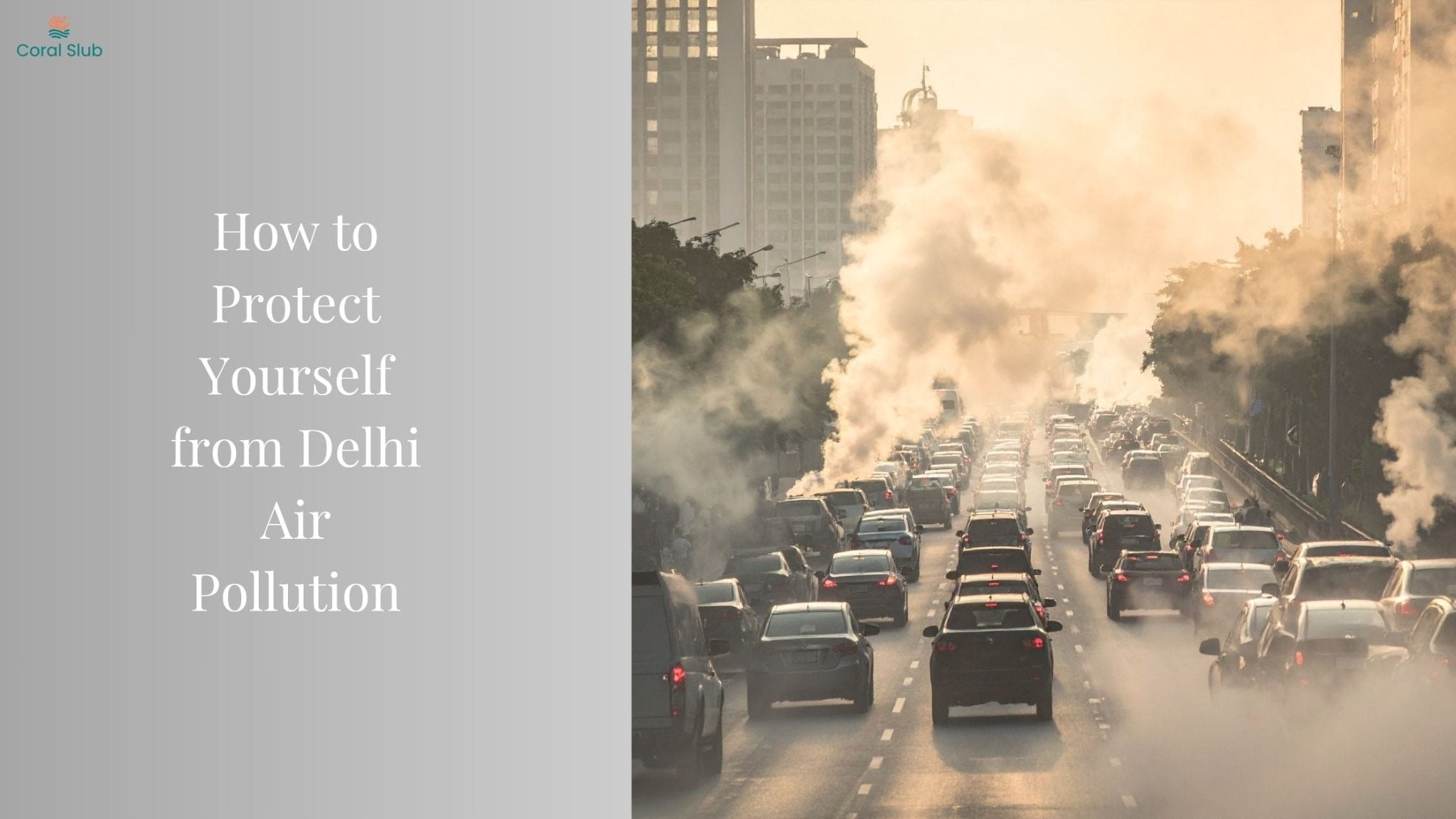Every November, Delhi becomes engulfed in a thick, toxic smog that transforms the city into one of the most polluted places on Earth. With the Air Quality Index (AQI) frequently reaching hazardous levels above 400 and sometimes spiking past 500 where residents face serious health risks that go far beyond just respiratory discomfort. Recent data shows PM2.5 levels in Delhi have reached 20 times the WHO's recommended standard, while PM10 levels exceed safe limits by 12 times.
But the impact isn't just physical. Research reveals that air pollution can trigger anxiety symptoms, panic attacks, and create a vicious cycle of respiratory distress and mental health challenges. The good news? There are proven strategies to protect yourself and your loved ones from this annual health crisis.
Understanding Delhi's Air Pollution Crisis

Delhi's air quality plummets to dangerous levels during winter months due to a perfect storm of contributing factors. Vehicular emissions account for approximately 40% of Delhi's air pollution, with over 11 million registered vehicles releasing harmful nitrogen oxides and particulate matter. Stubble burning in neighboring Punjab and Haryana adds massive amounts of PM2.5 and PM10 to the atmosphere. Construction dust continues despite bans, contributing 38% of PM2.5 and 56% of PM10 pollution.
10 Essential Tips to Protect Your Lung Health
1. Invest in Quality N95 or N99 Masks

When PM2.5 levels are 20 times above safe standards, ordinary cloth masks won't cut it. N95 or N99 masks filter out up to 99% of fine particulate matter. Choose reusable masks with changeable filters for regular outdoor use, and remember to replace filters frequently.Clogged filters make breathing harder and reduce effectiveness. Ensure your mask fits snugly around your nose and mouth with no gaps for maximum protection.
2. Monitor Air Quality in Real-Time

Stay informed using reliable apps and websites like AQI India, AirVisual, SAFAR-Air, and Plume Air Report, which provide real-time updates, forecasts, and health recommendations. The Central Pollution Control Board (CPCB) website gives comprehensive data across monitoring stations. Check the AQI before stepping outside and plan your day accordingly. Avoid peak pollution hours, typically 6-10 AM and 5-9 PM when vehicular emissions are highest and atmospheric conditions trap pollutants near ground level.
3. Create a Clean Air Sanctuary at Home

Your home should be your refuge from toxic air. Use HEPA air purifiers in bedrooms and living areas, they're highly effective at capturing PM2.5, pollen, dust, and other pollutants. Keep windows and doors closed during high pollution days to prevent outdoor pollutants from entering. Clean regularly to remove settled dust and avoid indoor pollution sources like incense, room fresheners, and smoking. Use exhaust fans while cooking to remove indoor pollutants, especially if you use gas stoves. Since the Delhi government has encouraged work-from-home arrangements during severe pollution episodes, optimizing your indoor air quality is more crucial than ever.
4. Time Your Outdoor Activities Wisely

Exercise is essential for lung health, but timing matters when you live in a polluted city. Check the AQI before outdoor workouts and exercise indoors when AQI exceeds 150, which is considered unhealthy for everyone. If you must go outside, choose times when pollution levels are lower, typically late morning to early afternoon. Avoid exercising near busy roads or industrial areas where pollutant concentrations are highest. Consider indoor alternatives like yoga, home workouts, or gym sessions with good air filtration. Breathing heavily during exercise in polluted air increases your exposure to harmful particles exponentially, so it's worth adjusting your routine.
5. Boost Your Immunity with Antioxidant-Rich Foods

Combat inflammation from pollutants with the right nutrition. Vitamin C-rich foods like oranges, lemons, amla, and bell peppers help neutralize free radicals. Antioxidant powerhouses such as spinach, berries, nuts, and walnuts protect cells from oxidative damage. Anti-inflammatory spices like turmeric in milk (haldi doodh), ginger tea, and tulsi (holy basil) tea reduce inflammation in airways. Omega-3 sources including flaxseeds, walnuts, and chia seeds support overall respiratory health. Stay hydrated by drinking plenty of water to help your body flush out toxins through natural detoxification pathways. These nutrients help reduce oxidative stress and inflammation caused by air pollutants.
6. Practice Breathing Techniques

Proper breathing techniques can strengthen your lungs and reduce anxiety related to poor air quality. Pursed lip breathing involves breathing in through your nose, then pursing your lips like you're about to whistle and exhaling slowly. This creates backpressure that helps release trapped air from your lungs. Deep breathing exercises with diaphragmatic breathing improve lung capacity and oxygen exchange. Progressive relaxation combining breathing with muscle relaxation reduces stress and anxiety while improving respiratory function. These techniques are especially helpful if you're experiencing shortness of breath or anxiety related to poor air quality.
7. Maintain Proper Humidity Levels

Dry air can irritate your respiratory tract and make breathing more difficult. Use a humidifier to add moisture to indoor air, aiming for 30-50% humidity for optimal respiratory comfort. Proper humidity helps relieve dryness, reduces coughing, and eases breathing for those with allergies or asthma. However, be careful not to over-humidify, as excessive moisture can promote mold growth. Regular cleaning of humidifiers is essential to prevent bacterial growth.
8. Know the Warning Signs and Seek Help

Recognize when symptoms require medical attention. Mild symptoms like dry cough, throat irritation, itchy eyes, and mild fatigue should be monitored but may not require immediate medical intervention. However, serious symptoms including chest pain or tightness, severe shortness of breath, persistent wheezing, rapid heartbeat, confusion, or dizziness require immediate medical help. People with pre-existing respiratory conditions should be especially vigilant and keep emergency medications readily available. Don't hesitate to visit emergency services or call for help if symptoms worsen rapidly.
9. Create an Action Plan for High Pollution Days

When AQI crosses 300 (Very Unhealthy) to 400+ (Hazardous), your action plan should include staying indoors with windows sealed, using air purifiers continuously throughout the day, and postponing all non-essential outdoor activities. Keep rescue inhalers and medications accessible in multiple locations within your home. Wear N95 masks for any unavoidable outdoor exposure, even if it's just for a few minutes. Monitor vulnerable family members closely, particularly children, elderly relatives, and those with respiratory conditions who may not always communicate their discomfort clearly.
10. Address the Mental Health Connection

Don't ignore the psychological impact of living with chronic air pollution. Practice stress management through regular meditation, deep breathing exercises, or journaling to process your anxiety about air quality. Stay active indoors to maintain both physical fitness and mental health.Exercise strengthens your respiratory system and releases endorphins that combat depression. Maintain social connections by talking about your concerns with friends, family, or support groups who understand the challenges of living in Delhi. Seek professional help if anxiety or depression symptoms persist for weeks or begin affecting your daily functioning. Set realistic daily goals to maintain a sense of control over your environment and wellbeing. Remember, managing anxiety about air quality isn't just about feeling better, it directly impacts your physical health and ability to cope with respiratory challenges.
Final Thoughts: Your Health, Your Priority
Living in Delhi during the pollution season requires vigilance, adaptation, and self-advocacy. Don't minimize your symptoms or delay seeking help because air pollution is a legitimate health crisis, and protecting yourself isn't being alarmist, it's being smart. You deserve to breathe clean air. Until that becomes a reality for all Delhi residents, arm yourself with knowledge, take protective measures, and never stop advocating for change. Your lungs are irreplaceable, so protect them fiercely.
Emergency Contacts

Keep these numbers readily accessible: Delhi Pollution Control Committee can be reached at 1800-11-0007 for reporting violations or seeking information, Emergency Medical Services at 102 for ambulance services, All India Institute of Medical Sciences (AIIMS) Emergency at 011-2658-8500, and Safdarjung Hospital Emergency at 011-2673-0000 for immediate medical attention.
Breathe Safe, Live Well, Fight for Clean Air. Delhi's future depends on us all.
Note: Information provided in this blog is purely for educational purposes only and no medical advice is intended. Always consult with a healthcare professional before starting any medical treatment or new medication.








